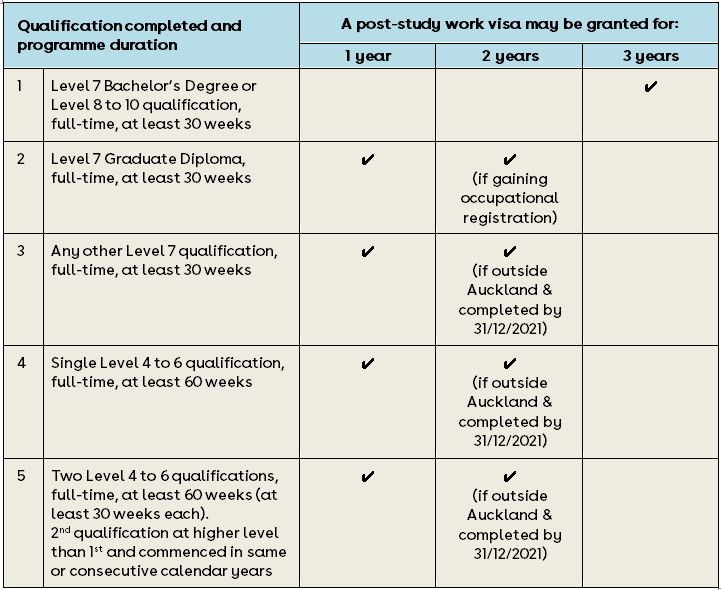As the economic impact of COVID-19 continues to widen, many work visa holders in New Zealand will find themselves in the unfortunate position where they have lost their employment or where Immigration New Zealand (INZ) will decline their next work visa application because of labour market pressures.
Affected work visa holders who are unable to secure replacement job offers or who are otherwise unable to have their work visas extended, will be pressured to voluntarily leave New Zealand and/or will become liable for deportation unless they are eligible for the grant of a different type of temporary visa.
For some, returning to their home country may be an acceptable outcome. However, for many individuals who have made significant sacrifices to make New Zealand their home, it will be necessary to form an alternative longer-term strategy for realising their dream to live in New Zealand.
Obtaining a student visa may well be a good option to continue staying lawfully in New Zealand in the short and medium-term, to increase one’s chances of securing employment in a post-COVID-19 world, and to rely on the post-study work visa programme as a potential pathway from study to work to residence.
The Immigration Team at Lane Neave has decades of combined experience assisting not only with the preparation and submission of student visa applications, but also with assisting to address the often complex issues raised by INZ as part of processing student visa applications.
Benefits of studying as an international student in New Zealand
1. Maintain lawful immigration status
A significant impact of the COVID-19 pandemic is the expected unemployment rate in New Zealand. It is predicted that due to the closure of businesses and economic contraction, the nation’s unemployment rates could increase to a staggering 30% in the worst case scenario (this rate was at 4% as of December 2019, according to Stats NZ). In response to this, it is expected the New Zealand Government will initiate and implement various policies to address this problem and migrant labour will be an obvious target.
Work visa applications that depend on the labour market (e.g. the Essential Skills Category) will become much harder to obtain as it will be much more difficult for employers to prove that there are no suitable New Zealanders available or trainable to undertake the role instead. Further, migrants holding temporary visas may find themselves being made redundant as businesses cease operations or are required to restructure in response to decreased service demands.
The employment of Kiwis ultimately remains a Government priority and it will become the main focus of the employment market in the foreseeable future. This will mean that migrant workers in roles that are either lower-skilled, lower-paid or both are unlikely to secure further work visas under the Essential Skills category. However, even work visa applications for more highly skilled and highly paid roles will come under increased scrutiny and will likely have higher decline rates than pre-COVID-19.
With the prospect of retaining, securing and applying for employment and work visas becoming more difficult, the avenue of studying and upskilling in New Zealand will become an invaluable option for those who wish to remain lawfully in the country until such a time that they are able to re-enter the labour market.
2. Ability to work part-time during the academic year and full-time during holidays
Another benefit of fee-paying student visas is the ability to undertake employment during the period of studies. Courses of study which meet INZ’s criteria may allow students to work part-time (up to 20 hours a week) whilst studying and full-time during scheduled holidays. The work rights are also open, meaning holders can work in any role, with any employer and in any location.
3. Ability to support temporary visas for partners/children (including partnership-based work visas and domestic student visas for dependents in certain circumstances)
The transition from working to studying is well suited for individuals, as well as families.
Eligible programmes of tertiary study that meet INZ’s requirements, may also allow the Principal Applicant to support their partner (for an open work visa or a visitor visa) and any dependent children (for a domestic student visa or a visitor visa).
4. Ability to obtain post-study work visas (for up to three years in certain circumstances) after successful completion of the course
Finally, and arguably the greatest benefit of studying as an international student, is the ability to later move on to a Post-Study work visa. Courses of study which meet criteria may potentially open up the pathway to obtain an open work visa to allow holders to work without conditions in any occupation for durations of one to three years (see below).
Post-study work visas
Following the successful completion of their studies, students may be eligible to transition onto an open, Post-Study work visa. This will allow them to gain work experience and ideally find skilled employment that is relevant to their field of study. This visa is not labour market tested meaning that if an offer of employment is made the person can start immediately.
Applicants may be eligible for a three year post-study work visa if they study towards a level 7 Bachelor’s degree or higher qualification for at least 30 weeks in total. Other courses of study (levels 4-7) may allow for the grant of a one or two year post study work depending on where the studies were completed.
The table below provides an overview of the qualification requirements and the corresponding durations which may be granted under the Post-Study work visa category.

Partners and dependent children
Partners are eligible for a partnership-based open work visa if the student visa holder studies level 7 or 8 qualifications in an area of absolute skills shortage, or if the student visa holder studies toward a level 9 or 10 qualification. This will also allow children to be granted student visas to study primary and secondary education in New Zealand as domestic students.
Dependent temporary visas are granted for the same duration as the Principal Applicant’s student visa, and this will beneficially allow the entire family unit to remain in the country together.
In circumstances where the programme of studies does not permit the dependent partner to be granted a work visa, they may be eligible for a visitor visa with the same expiry as the student visa in lieu. Whilst visitor visas do not allow holders to work, it will allow partners to remain in New Zealand and provide the integral opportunity for them to search for and possibly obtain employment offers. If successful and they are able to meet the relevant work visa requirements, they can then apply for a work visa in their own right.
General requirements for the grant of a student visa
1. Acceptable course
There are a multitude of requirements which need to be satisfied for applicants to be granted a student visa.
First, to be eligible applicants must be able to successfully obtain an offer of place in an approved course with a New Zealand education provider that meets foreign student requirements.
For tertiary institutes the requirements are governed under the Education Act 1989 and require programmes of three months or longer to be approved, the education provider needs to be accredited; and courses must not deprive any domestic or exempt students from being able to study at the institute. For private training establishments they must be registered by the New Zealand Qualifications Authority.
Lane Neave can connect you with a variety of education providers who offer courses that are “acceptable” as per INZ’s fee-paying student visa requirements.
2. Funds
A second consideration, and one that may be prohibitive for applicants who are considering this pathway, is the issue of fees. International students need to be aware of two types of fees: programme/tuition fees and maintenance fees.
The programme fees are set by education providers and are usually charged per semester or academic year. These fees differ from course to course and education provider to education provider.
”Maintenance fees” are prescribed by INZ and required to be genuinely available for use while studying in NZ. At present the amount is NZD$15,000 per year for a programme of study that is at least 36 weeks. For those of a shorter duration, the requirement is NZD$1,250 per month of study.
A possible alternative to holding funds personally is to be sponsored by a New Zealand citizen or resident. An eligible sponsor can be a relative, friend, organisation or government agency. It will then be necessary for the sponsor to demonstrate that they have sufficient funds for the student’s maintenance in New Zealand.
Sponsors have to satisfy a number of requirements to be considered “acceptable” by INZ and we encourage you to discuss any potential sponsorship arrangements with one of our experts before relying on it for purposes of a student visa application.
3. Health and character
While student visa applicants are ordinarily not required to provide medical and chest x-ray certificates (as they are required to hold health insurance for the duration of their studies), the usual health requirements must still be met. Therefore, if medical certificates have been provided with previous applications and medical concerns were noted, it is likely that these issues will continue to impact the grant of a student visa.
Police clearance certificates may also be required and applicants must also meet character requirements for the grant of this visa.
4. Bona fides
As with all temporary visas, student visas will only be granted if INZ is satisfied that the applicant satisfies “bona fide” requirements. This means that the applicant is intending a temporary stay in New Zealand and they will be undertaking a lawful purpose while in the country. Considerations of whether the applicant is likely to overstay, previous breaches of temporary visa conditions, their ability to leave or be deported and their commitments to their home country will all be assessed by INZ.
Possible issues re bona fides
In our experience, student visa applications submitted by the less conventional student, sometimes experience difficulty during processing. This includes situations where applicants previously held other temporary visas (such as work or visitor visas), individuals who are already qualified and those who are older than the usual tertiary aged student. In these types of circumstances, INZ is sometimes concerned that the applicant may not genuinely wish to study and may solely be applying for the student visa as a “last resort” to remain in New Zealand.
While the issues raised by INZ can be complex to address, high levels of success can be achieved via careful and skillful preparation of the application from the outset. This would encompass providing well-drafted applications with detailed study plans, pre-empting possible issues and addressing them at lodgement stage. Therefore, we would recommend applicants who may possibly face these concerns, to discuss their circumstances with us well in advance of the visa application process.
Conclusion
Should any of the above aspects apply to you, we invite you to contact Lane Neave to discuss your options further.
The sheer scope of our collective experience in dealing with all matters “study related”, gives us a unique understanding as to the study options that may or may not assist in achieving your long term goal of calling New Zealand your home.
Please reach out to us today and we look forward to being able to help you with your journey.
Sign up for news
Our team issue regular newsletters on immigration-related topics as well as up-to-the-minute alerts when immigration policy changes are announced.




